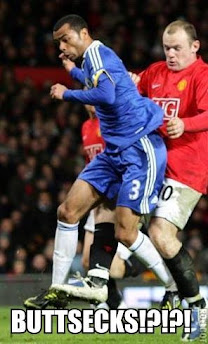 Want advice on how to go from playing in a World Cup at the age of 20 to defining mediocrity for a club in the
Want advice on how to go from playing in a World Cup at the age of 20 to defining mediocrity for a club in the
Having comprehensively failed during two seasons at United, and then subsequently at Aston Villa and Burnley in this country too, Djemba-Djemba was left with virtually nothing last year and was forced to head out into the desert as his last chance to resurrect a career that was heading off-the-rails almost as soon as it started. His is actually quite a tragic tale of a life shattered by bad advice and financial wastefulness; a cautionary lesson to any young footballer suddenly finding himself with excess cash. Djemba-Djemba made his name first with French top-flight side
Djemba-Djemba made his name first with French top-flight side 
Following a £2.5million move to United, club sources revealed that he would often splash out large sums of money arranging for large items, often even furniture, to be sent to
 Djemba-Djemba’s agent Christophe Mongay also spoke to the Nazi today, describing the star’s money problems as so bad that while at Old Trafford, he relied solely on his appearance fee and win bonus to get by as every other penny received went straight to creditors as loan repayments. At his peak Djemba-Djemba was amazingly running a fleet of ten 4 x 4 vehicles and had more than 30 different bank accounts for some reason. Mongay said:
Djemba-Djemba’s agent Christophe Mongay also spoke to the Nazi today, describing the star’s money problems as so bad that while at Old Trafford, he relied solely on his appearance fee and win bonus to get by as every other penny received went straight to creditors as loan repayments. At his peak Djemba-Djemba was amazingly running a fleet of ten 4 x 4 vehicles and had more than 30 different bank accounts for some reason. Mongay said:“When he arrived at Manchester United, I decided to take over the running of his accounts. It used to take me four hours a day! At United he was earning about £75,000 basic per month. But every penny was going straight to loan repayments. He was having to live on bonuses and extras.”
It’s quite baffling why exactly Djemba-Djemba felt the need to have ten cars in the first place, let alone ten jeeps. Perhaps he was doing airport runs in his spare-time to make a bit of extra coin? Or maybe it was even an elaborate prostitution ring, aimed specifically at those clients who liked off-roading and dogging? 30 bank accounts too, how did that happen? It’s almost as if literally every wage cheque went into a new account. Either that he actually replied to every one of those spam e-mails you get about releasing foreign diplomatic funds, and thought he’d dodge tax by setting up a string of illicit holdings.

Jokes aside, it’s a pretty tragic tale of what this business can do to a new talent, and as signings get younger and younger, and wages get higher and higher, I’m sure Mr Djemba-Djemba won’t be the last one left with his dream in tatters.

